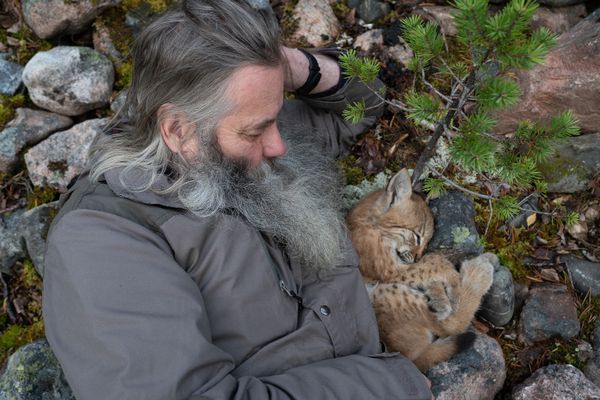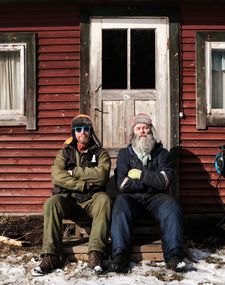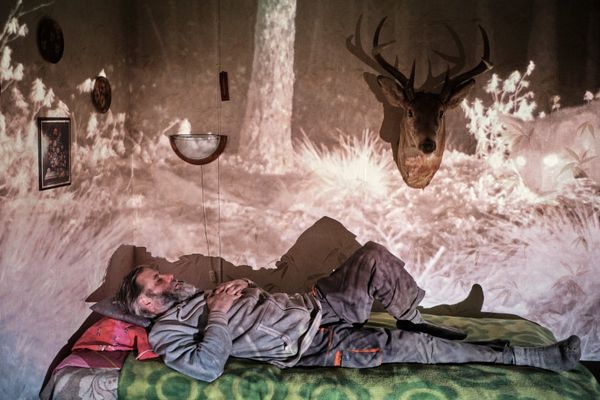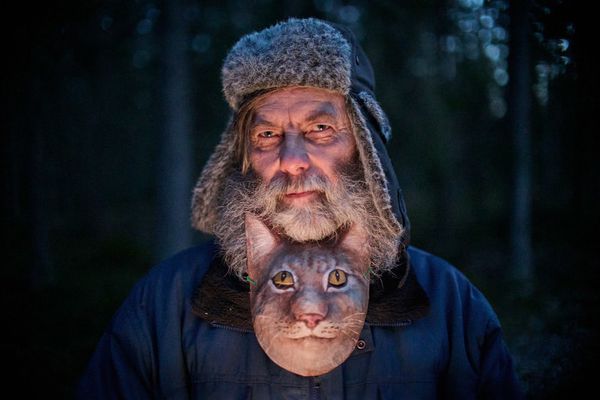 |
| Juha Suonpää says of Hannu Ratala: 'He was trying to amplify the story. But he needed me. So we were a perfect match' Photo: Juha Suonpää |
Suonpää says he came across Hannu “by accident” thanks to his own past as a wildlife photographer in the Eighties. Although he left the business, he still continued to visit events where those he knew were showing something. It was in 2015, at an event run by a union which buys forests to protect them in perpetuity, which was celebrating its 20th anniversary.
 |
| Juha Suonpää and Hannu Rantala Photo: Alexander Lembke |
The director, whose previous film Wolfman also concerned one man’s dedication to animals, says he likes to take his time.
Noting Wolfman took 15 years, he adds: “I'm very patient, waiting for the material to be saturated, to be ready for sculpture by the direction. I feel more like a sculptor rather than a film director. I want to be open enough to see what the material wants to say to me. I want to be surprised. I'm curious, like Sherlock Holmes, what's what's behind this?
“Getting the connection to the main protagonist in wolfman that took 15 years to do. So I was prepared with Hannu to do the same. the same.”
As it turned out, it was a lot simpler than that, because when he approached Hannu at the event, it turned out he had already seen Wolfman and liked it.
“He immediately, I think, realised this is the guy who could be an amplifier for his story. He was living in Western Finland in Rauma, it's not a big city. He was giving an interview to the very small local newspaper, but he was, I think, somehow kept as a crazy village person, as every village has.”
Suonpää suggests Hannu wasn’t really taken seriously despite the challenges that the lynx face in the area, where a fifth are killed annually by permission.
He adds: “He was trying to amplify the story. But he needed me. So we were a perfect match.”
 |
| Lynx Man also features projections of the footage. Juha Suonpää: 'I'm very patient, waiting for the material to be saturated, to be ready for sculpture by the direction' Photo: Alexander Lembke |
Suonpää’s film brings a sense of tradition and primal connection to the fore through the use of projections over the steam from Hannu’s sauna - and he says even the north-eastern version of Finnish which Hannu speaks has deep cultural roots.
“It's based on fishing, hunting, that kind of tradition,” he says, “In the words, you still smell the history of us who traveled to the north, and who were trying to survive. Vital to survival, was really knowing nature because otherwise it will kill you immediately. You have to follow the wolves in order to get the leftovers from them and things like that. Hannu has those kinds of roots.”
That sense of something more primal also feels connected to the use of the sauna, which holds a psychological as well as physical significance for many in countries like Finland and Estonia, where its use is traditional.
Suonpää says they used it every night they were shooting.
“It’s for mental cleaning. It is not a physical thing at all. It's a mental thing, where you are naked you are sitting outside the sauna and it's getting a little bit cold, you're steaming. In that moment, your eyes, your ears, your senses are altered.”
The sense of tradition is also evoked by the score, which draws on folk music. Suonpää says he came across the Estonian band Puuluup at a festival in their homeland - duo Ramo Teder and Marko Veisson.
Suonpää says there is a real warmth to their music and adds: “This is what I really wanted in Lynx Man, that there has to be hope. That’s what we need because otherwise we fall into depression.
“I think it's so much easier to show all the troubles we may have - but how to construct hope in our era? I felt that this way of playing, the tones they do, the rhythm, that has the joy of life. They are using a very traditional string instrument - Jouhikko is its name in Finnish. It’s the oldest instrument that is also in our Kalevala legend, our national legend, that's the instrument they are using in an updated way.”
The director adds that there’s an “emotional truth” to Hannu’s connection to the lynx. The director himself, still hasn’t physically seen one of the elusive animals in the wild in Hannu’s area, but he’s pretty happy about that.
He says: “I want to keep the distance and I think the magic of the Lynx is that they are looking at you all the time.”
He adds, jokingly: “It’s very easy to film lynx. You just put a Christmas decoration in a tree… then wait eight years.”
On a more serious note, I ask how Suonpää feels about the future for the lynx in his homeland.
He says: “Killing for fun is not sustainable. It feels like the history and tradition of hunting has long roots - but it doesn't work any more. We are living through the sixth mass extinction. All the old ways have brought us here; we are in a total crisis. We have to redefine and reimagine our relationship with nature, how we behave with non-human animals, how we face them. That's a crucial aspect, just to save us basically.
 |
| Hannu Rantala in Lynx Man Photo: Alexander Lembke |
“But the future of the lynx is a success story. We just have to let them come closer into our hearts. We have to break the linear consumerism way of thinking into a circular one where we are part of the ecosystem. And actually, through the work of Hannu and the complaint he made, the decision of the highest court in Finland means now the killing rates dropped 50% in one year.”
Suonpää says he’s already got his next film - about rats - in his sights and that his filmmaking is speeding up. Among the ‘stars’ is Reino, a rat which lives in the director’s chicken coop.
“He moved out into our chicken coop last September and since then, I've been putting the cameras in and I've been observing him. He is observing me, of course, also. Every night he waits untilI have put some food down and then he comes. He's a bachelor, a lonely boy. But if a lady lady rat will come then I’m in deep shit, he could be a problem.”
But Reino isn’t the only rat in his life. He adds: “I've been establishing a refugee camp for rats already - so that will await him if he gets to excited. But as long as he is a bachelor, I'm okay with that - they are very harmless. I have a refugee camp. I trap the wild rats that are problematic in some parts of the city. I trap them alive and transport them to the refugee camp. And that's the beginning of the new story. Wolfman, Lynx Man - am I the rat man?”
I guess we’ll have to wait a few years - although Suonpää assures me it won’t be 15 - to find out.





















